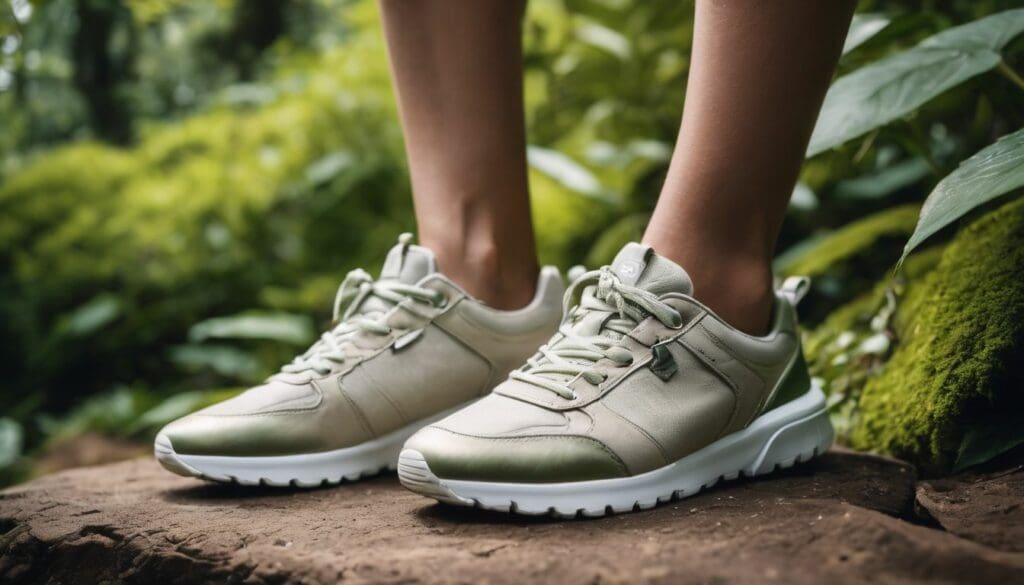As we journey through life, our shoes do so much more than simply support our steps; they leave an indelible imprint on the environment – a reality that’s become increasingly difficult to overlook.
We understand that trying to strike the right note between fashion, comfort and eco-consciousness might feel like a tall order – trust us, it’s a path well-trodden in our quest for knowledge.
What we’ve unearthed is both enlightening and heartening: as of 2019, the sustainable footwear market has soared to new heights with a valuation of $7.5 billion. Our feature aims to shine a gentle light on how you can make earth-friendly shoe choices without compromising on style or trailing behind in environmental responsibility.
Embark upon this verdant voyage with us, and let’s step into a pair of planet-pleasing shoes together!
Key Takeaways
- Sustainable shoes use eco – friendly materials like recycled plastic bottles, repurposed rubber, and organic cotton to lessen environmental impact.
- Brands such as Ethletic, VEJA, and Allbirds are leading the market in sustainable footwear with a commitment to ethical practices and reducing carbon emissions.
- The shift towards sustainable shoe production is fuelled by consumers who value environmentally friendly products that do not sacrifice style or quality.
- Natural materials such as cork, hemp, jute, and pineapple leaf fibre offer renewable alternatives for eco-conscious shoe designs.
- Making sustainable footwear choices involves researching brand values, looking for certifications of sustainability and supporting brands committed to ethical standards.
The Importance of Sustainable Footwear
Sustainable footwear is essential for reducing the environmental impact of the fashion industry. It promotes responsible consumerism and helps minimise waste and carbon footprint.
What are Sustainable Shoes?
Sustainable shoes are all about reducing our footprint on the planet, crafted with materials and processes that are kinder to the environment. They integrate eco-friendly materials such as recycled plastic bottles, repurposed rubber, and natural components that have minimal impact on the earth.
As avid gamers value performance without compromising on ethics, we appreciate footwear brands like Ethletic that weave sustainability into every step from design to development.
We’re seeing a surge in demand for sustainable shoe power as consciousness grows among consumers who want products aligning with their environmental values. The market responded with an impressive $7.5 billion valuation in 2019 and shows no signs of slowing down.
These eco-conscious shoes bridge style with responsibility; they empower us to make choices that reflect our commitment to both gaming excellence and planetary health.
How Can Shoes Be Sustainable?
Shoes can be sustainable by using environmentally friendly materials such as recycled plastic bottles, repurposed rubber, and organic cotton. This makes a significant impact on reducing the environmental footprint of footwear production.
Brands like Allbirds and VEJA exemplify sustainability in their shoe designs with innovative use of eco-friendly materials. Additionally, manufacturing processes that incorporate fair labor practices and reduce carbon emissions contribute to the overall sustainability of shoes.
To make shoes more sustainable, companies are adopting ethical standards throughout the supply chain, from sourcing raw materials to production methods. The push for sustainable shoe production is driven by consumer demand for eco-friendly products and brands’ commitment to reducing environmental impact.
Materials Used in Sustainable Shoes
Sustainable shoes are made from a variety of eco-friendly materials, including recycled materials, natural materials such as organic cotton and hemp, and sustainable leather substitutes like pineapple leaf fibre.
These materials help reduce the environmental impact of footwear production and contribute to a more sustainable future.
Recycled materials
- Recycled plastic bottles: Many sustainable shoe brands use recycled plastic bottles to create the uppers of their footwear, preventing these items from ending up in landfills or oceans.
- Repurposed rubber: Some brands utilise repurposed rubber from old tyres or other sources to make the soles of their shoes, diverting rubber waste and giving it a new purpose.
- Recycled textiles: Fabrics such as recycled polyester or nylon are commonly used in eco-friendly shoes, reducing the demand for virgin materials and lessening environmental impact.
- Reclaimed leather: In some cases, sustainable shoe companies repurpose leather from discarded goods or scraps to minimise waste and promote resource efficiency.
- Recycled foam: Manufacturers may incorporate recycled foam into the cushioning of sustainable shoes, diverting foam waste while providing comfortable support for wearers.
Natural materials
- Cork: Sustainably harvested from the bark of cork oak trees, this material is lightweight and offers natural shock absorption, making it ideal for insoles and outsoles.
- Hemp: Known for its durability and breathability, hemp is used in sustainable shoes for uppers and linings, providing a comfortable and long-lasting option.
- Organic Cotton: Grown without synthetic pesticides or fertilisers, organic cotton is utilised in sustainable shoe manufacturing for its softness, breathability, and reduced environmental impact.
- Jute: A fast-growing plant fibre that requires minimal water and no chemical inputs, jute is commonly used in eco-friendly footwear for creating robust and biodegradable soles.
Sustainable leather substitutes
Sustainable leather substitutes play a crucial role in creating eco-friendly footwear. These alternatives help reduce the environmental impact of traditional leather production and meet the growing demand for sustainable materials. Several innovative and planet-friendly options are available in the market, such as pineapple leaf fibre, apple peel leather, and mushroom leather. Each of these substitutes offers durability, comfort, and a cruelty-free option for conscious consumers.
The Manufacturing Process and Ethical Standards
When it comes to sustainable footwear, the manufacturing process and ethical standards play a crucial role. From fair labor practices to reducing carbon footprint and waste, it’s important for eco-conscious consumers to consider how their shoes are made.
Making informed choices about the brands they support can make a significant impact on the environment and society.
Fair labor practices
Sustainable footwear brands prioritise fair labour practices, ensuring that workers involved in the manufacturing process are treated ethically and provided with safe working conditions.
This includes fair wages and appropriate working hours to uphold the dignity of all individuals involved in producing eco-friendly shoes. By supporting brands that are committed to fair labour practices, consumers play a crucial role in promoting social responsibility within the fashion industry.
The importance of fair labour practices is underscored by the commitment of sustainable shoe brands such as VEJA and Allbirds, which advocate for ethical treatment of workers throughout their supply chains.
Reducing carbon footprint
Transitioning from fair labour practices, another crucial aspect of sustainable footwear is reducing the carbon footprint. This involves minimising the environmental impact of manufacturing processes and transportation.
Sustainable footwear brands are adopting eco-friendly production techniques, such as utilising renewable energy sources and implementing energy-efficient technologies to reduce emissions.
Additionally, they prioritise local sourcing and manufacturing to decrease transportation-related carbon emissions while promoting a circular economy through recycling initiatives in their supply chain.
The use of recycled materials also plays a significant role in lowering the carbon footprint of sustainable shoe production. For instance, brands are repurposing plastic bottles and rubber into shoe components, diverting waste from landfills and reducing the need for virgin resources.
Reducing waste
Footwear brands are actively finding ways to reduce waste in their manufacturing processes. This involves using innovative techniques to minimise the amount of material discarded during production, such as pattern optimisation and efficient cutting methods.
Additionally, some brands implement recycling programmes that encourage customers to return old shoes for repurposing rather than disposing of them in landfills. Ethical fashion brands like Nothing New have committed to upcycling plastic bottles and fishing nets into durable shoe materials, aiming to reduce environmental impact while creating stylish and sustainable footwear options.
The sustainable footwear market is driven by consumer demand for eco-friendly products with minimal environmental footprints. Embracing principles of circularity, ethical shoe manufacturers focus on reducing waste at every stage of production.
Examples of Sustainable Footwear Brands
Nothing New, CARIUMA, VEJA, Allbirds, PSUDO and Wildling Shoes are just a few examples of sustainable footwear brands leading the way in eco-friendly shoe production. Read on to discover more about these innovative brands and their commitment to sustainability.
Nothing New
Nothing New is a sustainable footwear brand that resonates with environmentally responsible consumers. This brand uses 100% post-consumer recycled plastic bottles to create its trainers, making them an excellent choice for those seeking eco-friendly options.
Nothing New also emphasises ethical manufacturing practices and fair labour standards in the production of their shoes, aligning with the values of conscious consumerism.
The use of recycled materials in Nothing New trainers reduces waste and addresses environmental concerns associated with traditional shoe production. By choosing Nothing New footwear, passionate gamers and novice gamers alike can actively contribute to a more sustainable fashion industry without compromising style or quality.
CARIUMA
Transitioning from sustainable footwear brand “Nothing New,” let’s explore another eco-conscious option – CARIUMA. CARIUMA prioritises sustainability without sacrificing style or comfort, making them a popular choice for conscious consumers.
The brand utilises eco-friendly materials such as bamboo, recycled rubber, and leather that meets rigorous environmental certification standards. This ensures that their shoes are not only stylish but also minimise the environmental impact through responsible sourcing and manufacturing processes.
CARIUMA’s commitment to ethical production practices extends to fair labour standards and reduced carbon footprint, aligning with the growing demand for eco-friendly products in the fashion industry.
VEJA
Transitioning from CARIUMA, we now turn our attention to VEJA – a renowned sustainable footwear brand that has made significant waves in the industry. VEJA is known for its commitment to using eco-friendly materials and ethical manufacturing processes.
The brand has gained widespread recognition for its innovative use of sustainably sourced materials such as organic cotton, wild rubber from the Amazon rainforest, and recycled plastic bottles.
With a strong focus on fair labour practices and transparency in their supply chain, VEJA continues to lead the way in sustainable shoe production.
Furthermore, by producing stylish and durable trainers while minimising environmental impact, VEJA has captured the attention of consumers who are increasingly seeking planet-friendly shoes without compromising on quality or style.
Allbirds
Allbirds, a popular sustainable footwear brand, has gained recognition for its commitment to eco-friendly materials and ethical manufacturing processes. Their shoes are made from renewable resources such as merino wool, eucalyptus tree fibre, and sugarcane.
In addition to using these environmentally friendly materials, Allbirds implements innovative techniques like carbon-neutral shipping and 90% recycled packaging. The brand’s dedication to sustainability is evident in their partnership with the United Nations Climate Neutral Now initiative to offset their carbon emissions.
Allbirds’ focus on transparency and environmental responsibility resonates with the growing demand for planet-friendly products among consumers.
The innovative approach of Allbirds results in footwear that not only reduces environmental impact but also provides comfort and style. By prioritising sustainability without compromising quality or design, Allbirds sets an example for other brands in the industry.
PSUDO
Transitioning from eco-friendly brands like Allbirds to the next spotlight, PSUDO. This brand gains recognition for its commitment to sustainable practices and footwear innovation.
By incorporating environmentally responsible materials and ethical manufacturing standards, PSUDO meets the demand for stylish, durable shoes that minimise environmental impact. With a focus on recycled materials and reducing waste during production, PSUDO exemplifies how sustainability can be seamlessly integrated into footwear design without compromising style or performance.
The utilisation of recycled plastic bottles and repurposed rubber in PSUDO’s shoe designs aligns with consumer demand for planet-friendly products. By offering a range of environmentally conscious options, including ecofriendly trainers and sustainable running shoes, PSUDO contributes to shaping an increasingly sustainable fashion industry while catering to the needs of passionate gamers and novice gamers alike.
Wildling Shoes
Supporting the sustainable footwear movement, Wildling Shoes embraces a unique approach by creating minimalistic, lightweight, and flexible shoes suitable for both urban environments and nature exploration.
Inspired by the concept of “barefoot shoes,” Wildling promotes natural foot movement while utilising eco-friendly materials such as recycled rubber soles and organic cotton uppers.
Their commitment to sustainability extends beyond material choices, with a focus on fair labour practices and reducing their carbon footprint during production. Committed to transparency, Wildling Shoes shares detailed information about their supply chain and environmental impact, empowering consumers to make informed and environmentally conscious purchasing decisions.
Driven by consumer demand for eco-friendly products in the footwear industry, Wildling Shoes has gained popularity among those seeking sustainable options without compromising style or functionality.
How to Make Sustainable Footwear Choices
When looking for sustainable footwear, consider the materials used, research brand values and practices, look for certifications, buy secondhand or repair shoes, support sustainable shoe brands and properly dispose of old shoes.
Making conscious choices can help reduce your environmental impact while still enjoying stylish and comfortable footwear.
Look for sustainable materials
When choosing footwear, look for sustainable materials such as recycled plastic bottles and repurposed rubber. Sustainable shoes are made from environmentally conscious materials to reduce their impact on the planet.
Brands like Allbirds and VEJA use these eco-friendly materials to create stylish and durable shoes, catering to your gaming lifestyle while supporting environmental responsibility.
By opting for sustainable sneakers made from recycled materials, you actively contribute to a more environmentally conscious fashion industry and align with the growing demand for eco-friendly products in the market.
Research brand values and practices
Sustainable footwear starts with understanding the brand behind the product. By researching their values and practices, we can choose to support companies that align with our environmental concerns.
Many sustainable shoe brands emphasise fair labour practices, reducing carbon footprint, and utilising eco-friendly materials in their manufacturing processes. For example, Ethletic is a brand known for using a high proportion of eco-friendly materials in their shoes.
Doing thorough research on company values allows us to make informed decisions and actively support environmentally responsible businesses.
When exploring sustainable footwear options, it’s essential to look for certifications like B Corp or Fair Trade to ensure transparency in ethical standards and sustainability efforts from the brands.
Consider certifications
To ensure that the footwear you purchase meets sustainable standards, consider looking for certifications from reputable organisations. Certifications such as the Global Recycled Standard (GRS) or Bluesign can guarantee that the shoes are made from environmentally friendly materials and manufactured with ethical labour practices.
For example, Veja, a popular sustainable shoe brand, proudly displays its Fair Trade and Organic certifications on their products, ensuring consumers of their commitment to ethical production practices.
Keeping an eye out for these certifications helps in making informed decisions when choosing eco-friendly footwear.
Buy secondhand or repair shoes
When considering sustainable footwear options, buying secondhand or repairing shoes is a practical and environmentally responsible choice. By purchasing pre-owned shoes or repairing your current ones, you extend the life cycle of the product and reduce waste.
This action also reduces the need for new materials and production, aligning with eco-conscious principles. Additionally, opting for repair services supports local businesses and artisans who specialise in shoe maintenance while saving valuable resources.
To make informed sustainability choices for footwear, it’s crucial to recognise the impact of purchasing secondhand or investing in repairs on reducing environmental footprint. Let’s delve into strategies that support sustainable shoe decisions.
Support sustainable shoe brands
Support sustainable shoe brands by choosing footwear made from eco-friendly materials and produced in ethical manufacturing processes. Look for brands that prioritise the use of recycled materials, such as plastic bottles and repurposed rubber, to reduce environmental impact.
Seek out companies that adhere to fair labour practices and are transparent about their efforts to minimise carbon footprint and waste during production.
By opting for sustainable footwear brands, consumers can actively contribute to a more environmentally conscious fashion industry. Consider supporting Nothing New, CARIUMA, VEJA, Allbirds, PSUDO, or Wildling Shoes – all of which are committed to sustainability through their choice of materials and ethical standards.
Properly dispose of old shoes
Improperly disposing of old shoes can have a significant environmental impact, contributing to excess waste in landfills and harming the planet. When old shoes end up in landfills, they take years to decompose, releasing harmful chemicals into the soil and waterways.
Additionally, used shoes that are not disposed of properly can contribute to air pollution through incineration processes. To reduce this negative impact, consider donating your old shoes to charity or shoe recycling programs – some brands even offer incentives for returning worn-out footwear.
By taking steps to properly dispose of old shoes, we can all play a part in reducing our environmental footprint and promoting sustainable practices within the fashion industry. It’s essential for us as conscious consumers to understand the significance of responsible shoe disposal and make informed decisions about how we handle retired footwear.
Conclusion
In conclusion, sustainable footwear is a growing industry driven by consumer demand for eco-friendly products. Brands are transitioning to environmentally conscious materials like recycled plastic bottles and repurposed rubber in their shoe design and manufacturing processes.
Supporting shoes made from recycled materials contributes to a more sustainable and environmentally conscious fashion industry, reflecting consumers’ increasing interest in eco-friendly products.
The shift towards sustainability in the footwear market reflects a wider trend of environmental consciousness among consumers and indicates a positive step towards reducing environmental impact in the fashion industry.
FAQs
1. What makes a shoe eco-friendly?
A shoe becomes eco-friendly when it is made from sustainable materials, like recycled plastic or other planet-friendly substances that reduce harm to the environment.
2. Can hiking shoes also be sustainable?
Absolutely! Eco-conscious hikers can find sustainable hiking shoes designed with ecofriendly materials perfect for outdoor adventures while caring for the planet.
3. Are there any brands specialising in recycled footwear?
Yes, several environmentally responsible shoe brands focus on creating footwear using a high percentage of recycled materials, offering green options for consumers.
4. Why should I consider buying ecoconscious shoes?
Ecoconscious shoes help minimise your carbon footprint as they use environmentally friendly methods and materials, making them a smart choice for those who value our planet’s health.
5. Is there a variety of styles available in ecofriendly footwear?
Certainly! Whether you’re looking for casual wear, or sports-specific gear like hiking boots, many companies offer an array of stylish options in their collections of ecofriendly products.





